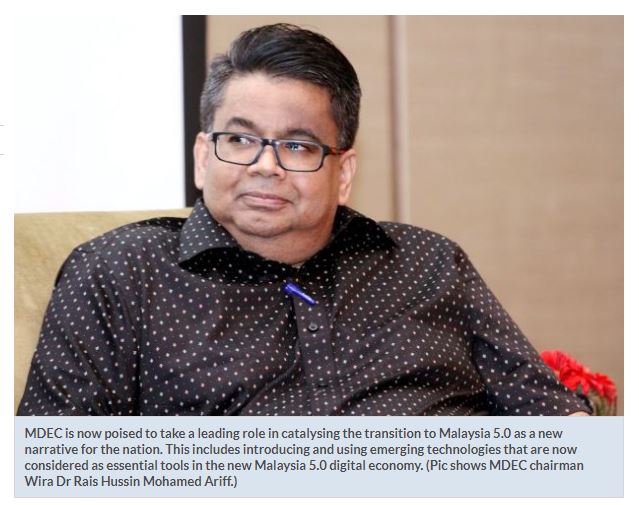Insight: Malaysia 5.0 – Digital transformation for businesses
THE aspirations for the Malaysia Digital Economy Corp (MDEC) is to firmly establish Malaysia as the heart of digital Asean, a regional digital powerhouse and industry trailblazer. In this role, it had launched global champions to lead the Fourth Industrial Revolution (4IR).
This includes ensuring the digital economy will drive forward the promise of shared prosperity for all Malaysians and still delivering on its promise of being inclusive and rewarding for all.
All these are focused on three primary drivers: empowering Malaysians with digital skills, enabling digitally-powered businesses, and driving digital investments.
At the cusp of the 4IR, Malaysia is blessed with the chance of re-engineering the human experiment using technologies that decentralise authority and de-emphasise divisions along the lines of colour, creed and country – what the Japanese have coined as “Society 5.0”.
This concept is now being adopted here as “Malaysia 5.0”.
In describing the next stage for the evolution of societal communities and socio-economy trends, Society 5.0 is built around the needs for a human-centred society.
MDEC is now poised to take a leading role in catalysing the transition to Malaysia 5.0 as a new narrative for the nation.
This includes introducing and using emerging technologies that are now considered as essential tools in the new Malaysia 5.0 digital economy.
With Malaysia 5.0, the digital economy can contribute to a more sustainable and circular economy.
This will ensure greater well-being is now possible for all citizens regardless of age, ethnicity and class.
Malaysia has over one million small- and medium-sized enterprises (SMEs) making up 98% of total businesses.
Many of these businesses consist of micro-SMEs, with 21% being female entrepreneursor founders.
These SMEs face challenges, like lack of business connections, limited awareness of tools, access to funding, education and lack of internet presence in a world going full digital.
Of all these businesses, only a third have employees.
Micro-SME’s are mostly “self-employed” individuals managing a very small non-incorporated business that may or may not be the owner’s principal source of income.SMEs are key to strengthening productivity, delivering more inclusive growths, and enabling adaptation to major economic transformations for this decade.
They are very heterogeneous in their characteristics and performance, both of which produced varying productivity performances across industry sectors.
The persistent gap between SMEs and large firms had already affected the growth potential and income distribution.
That is why effective measures that enable SMEs to scale up and innovate must now have considerable economic and social impacts, can ensure the country participates in the global economy and still can innovate as well as grow the economy.One particular industry that Malaysian SMEs could become a world pioneer for is with Islamic financial technolofy (fintech).
Already a world leader in Islamic finance, Malaysia is in a strong position to harness the various opportunities that Islamic fintech has to offer.
According to figures from the International Monetary Fund (IMF), Islamic bank loans had expanded by 8.9% year-on-year in 2018, compared with the 2.5% that conventional banks generated.
This has highlighted the rising demand around the world for syariah-compliant financial services.
As is, Islamic finance is now entrenched in Malaysia, accounting for 32% of financing to customers.
Yet, according to the IMF, Islamic fintech is still in its infancy in Malaysia with just a handful of start-ups and SMEs.
Both are not as agile in accelerating its transformative potential as compared with countries such as Indonesia.
In Malaysia, the growth of Islamic fintech will impact development in rural areas, especially among ethnic Malays.
This will become the backbone for this community as unique financial-inclusion opportunities will ensure they can catch up and increase their contribution to Malaysia’s socio-economic development.
Datuk Wira Dr Rais Hussin is chairman of Malaysia Digital Economy Corp. The views expressed here are the writer’s own.
Source: https://www.thestar.com.my/business/business-news/2020/09/21/insight-malaysia-50—digital-transformation-for-businesses


 Thailand
Thailand




